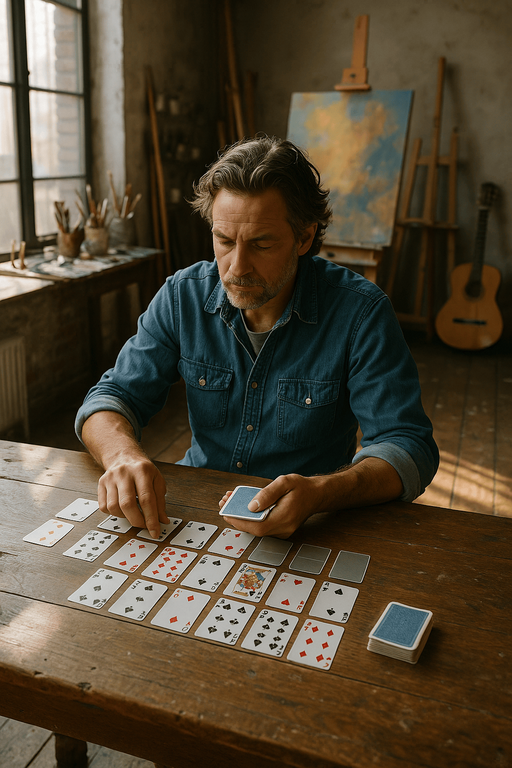
Famous People and Solitaire: Why Quiet Cards Keep Big Lives in Balance
Solitaire has always been the quiet person’s game: one tableau, one mind, no timer, no audience. Beneath that simplicity lives real training for attention, memory, and patience—skills that busy public figures need as much as anyone. It’s no surprise that across centuries, leaders, artists, and modern icons have reached for solitaire game between speeches, shoots, meetings, and flights.
Why High-Profile People Reach for a Low-Profile Game
No pressure, no deadline.
A hand of solitaire can stay open and wait. There’s no “round ends in 60 seconds,” no social feed pulling attention away. It’s a rare space where a demanding schedule doesn’t dictate the pace.
Clear beginning and end.
One deal, one goal, one finish. That sense of completion is a powerful counterweight to projects that drag on for weeks.
Mental hygiene.
Sorting and untangling a layout taps working memory and planning. The brain gets a light workout that sharpens focus without spiking stress.
Discretion.
Solitaire is quiet. It fits green rooms, waiting cars, and office breaks without calling attention to itself.
Snapshots from History and Culture
Napoleon and the island hours.
Popular lore often pairs the exiled emperor with patient card puzzles—methodical minutes to balance a turbulent life story.
A Victorian habit.
In Queen Victoria’s era, “patience” flourished as a refined pastime. Court life valued calm, decorum, and ritual; a contemplative card layout fit perfectly.
Churchill and the hard puzzles.
Biographical anecdotes sometimes credit Winston Churchill with a taste for tougher, two-deck variants. The image resonates: strategy, timing, and the courage to wait for the right move.
The PC boom.
When home and office computers became universal, solitaire turned into everyone’s mental palate cleanser. Between emails, rehearsals, edits, and briefings, many public figures treated a quick layout like a reset button—no noise, no comparison, just a neat puzzle that ends when it ends.
(These associations are part of cultural memory and public anecdotes; they capture why the game’s tone matches high-pressure lives.)
What This “Quiet Training” Actually Builds
Patience without passivity.
Great players don’t force a move; they set up the board so the right move appears. That habit translates neatly to negotiations, rehearsals, and deadlines.
Working memory.
Tracking where blockers sit and which ranks remain hidden keeps the mind limber in a low-stress way.
Decision clarity.
Solitaire rewards clean choices: reveal a card, create space, consolidate a sequence. The brain practices choosing for impact, not noise.
Graceful stopping.
Ending a hand at a natural pause—rather than chasing “just one more”—models healthy boundaries for time and attention.
Variants That Match Different Moods
- Klondike (classic): Balanced chance and strategy; ideal for a gentle reset between tasks.
- Spider: More planning and depth; satisfying when the mind wants a bigger challenge.
- TriPeaks or Pyramid: A rhythmic, chain-like feel that lifts energy without pressure.
When the day’s rhythm asks for a calm, contained break, solitaire classic offers that same unhurried experience on any screen: the layout waits, the pace is yours, and the session ends cleanly when you’re ready.
A Star-Worthy Micro-Routine
Set the stage (30 seconds). Take a breath, soften shoulders, open one layout.
Name one goal. “Flip a hidden card early,” or “create one empty space,” or “tidy one suit.”
Play without forcing. If a line feels strained, back up two moves and choose the simpler path.
Stop on clarity. When focus returns—win or not—close the hand. That neat finish is the whole point.
This tiny ritual replaces anxious scrolling with a compact win: clearer attention, steadier tempo, and a mind ready for the next real-world scene.
Why the Game Endures—On and Off the Stage
The qualities that keep audiences leaning in—poise, timing, selective intensity—are the same qualities solitaire quietly cultivates. It’s a pocket-sized practice of patience and precision, available any time, anywhere. Fame or not, a few thoughtful moves can turn a noisy day into a more deliberate one—and that’s a habit worth keeping.
